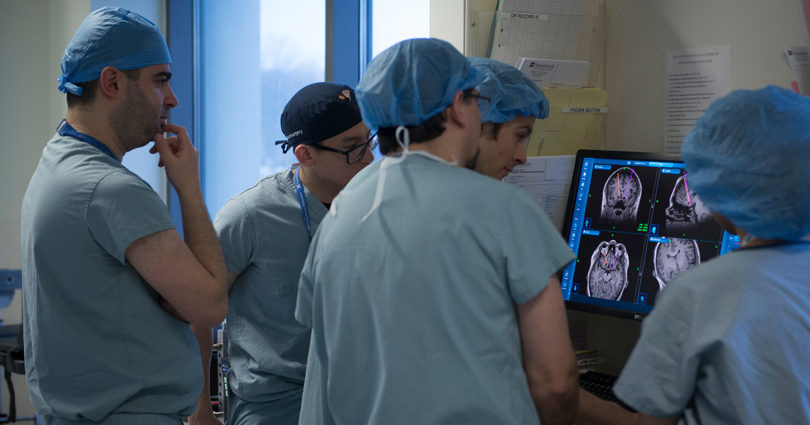For the first time in Canada, Sunnybrook researchers are investigating a new approach to treating PTSD.
February 2019 marks the launch of a phase 1 study examining the safety and feasibility of deep brain stimulation (DBS) as a potential way to help people with treatment-resistant post-traumatic stress sisorder (PTSD).
Drs. Nir Lipsman, Peter Giacobbe and Clement Hamani, are part of the team behind this leading edge research, and share insight on the importance of finding novel treatments for PTSD and why DBS, may be the latest innovation to help treat PTSD.
Who will this research help?
Dr. Lipsman: PTSD is a common anxiety disorder affecting millions of patients worldwide. Although a large proportion of patients benefit from medical and psychotherapeutic treatments, up to a third of patients do not respond, and are considered to have treatment-resistant PTSD. The goal is to determine the safety of DBS as a possible treatment option that could help this group of patients.
Dr. Giacobbe: PTSD can affect those who experience traumatic events or dangerous scenarios. Symptoms can include depression, anxiety, flashbacks and nightmares. Our research will help us understand the neurobiology of PTSD and explore the feasibility of a direct-to-brain treatment for this disorder. Given that a significant percentage of people do not respond to conventional treatments, we need to look at new approaches to treating this group of PTSD sufferers.
What is DBS?
Clement Hamani: Deep brain stimulation, or DBS, involves the implantation of electrodes into specific areas of the brain that are associated with symptoms of the disease. These are connected to a device called a stimulator, which generates small pulses of electrical current that affect activity in dysfunctional brain regions and networks.
Dr. Lipsman: PTSD is not a disease of a specific structure, or even a specific circuit. There are overlapping circuits and structures that play a role in generating and maintaining the illness. The key is to identify a structure that we can safely target with DBS that is in a position to influence other structures up and down-stream from it.
DBS has been used for movement disorders like Parkinson’s disease and tremor, and is now being investigated for a wide range of disorders, such as depression, OCD, and now PTSD, where we can link activity in specific structures and circuits to behaviours. This is the first trial of its kind, dedicated to investigating DBS in treatment-resistant PTSD.
What area of the brain is being focused on in this trial and why?
Clement Hamani: The ventromedial prefrontal cortex (VM PFC), which is known to play a role in the mechanisms of PTSD, will be targeted. Our study will not only be the first in Canada but also the first to recruit a series of patients.
Dr. Lipsman: The VM PFC is a critical structure for regulating emotion, controlling an individual’s mood, as well as decision-making linked to mood. It has also been implicated in anxiety disorders, and is overactive in conditions such as depression, OCD and PTSD. Disrupting its activity with brain stimulation may help control these symptoms, and allow patients to try other treatments which were previously in effective.
Dr. GIacobbe: This is the first larger-scale study in the world exploring DBS in PTSD. DBS is a surgical approach to treating brain diseases which has been employed in a variety of neurological and psychiatric conditions, but up until now there have not been any large-scale studies of it for PTSD.
What does it mean to have this PTSD trial conducted at Sunnybrook?
Dr. Lipsman: In December 2018, Sunnybrook was awarded a $1.25 million grant through Veterans Affairs Canada’s (VAC) Veteran and Family Well-Being Fund. Given that Sunnybrook has provided care for veterans for decades, having started out as a veterans’ hospital, to have a program and trial where we are investigating the latest, cutting-edge approaches for the treatment of these vulnerable patients is very special to all of us working on these projects.
We have the opportunity to learn a great deal about the brain circuits driving PTSD, why some get the condition, why others don’t, and what are the factors that predict how patients will, or not, respond to treatment.
Sunnybrook is unique in that it has globally recognized expertise in mood and anxiety disorders, brain imaging, neuropsychology, and neuromodulation, all aligned to develop novel therapies for those patients who need it most, those who have failed conventional treatment.
The support from VAC is an incredible recognition of that unique position, and we are excited to work together with VAC to advance this work, and reach as many veterans and other Canadians, as we can.
What does this trial mean for patients and their families?
Dr. Lipsman: This trial means applying the latest in imaging and neuromodulation to developing a ‘precision-strike’ treatment for PTSD. It is still in the very early stages, as the goal of phase 1 is to determine whether the treatment is safe and feasible, but we are also collecting valuable efficacy and outcome data. The goal is to develop larger trials ultimately see whether, in highly selected cases, DBS can be an effective treatment option.
DBS is part of a broader strategy at the Harquail Centre and Sunnybrook to offer the full spectrum of neuromodulation strategies to patients with resistant neurologic and psychiatric conditions. The idea is to match potential treatments with patients and determine what approach would work best specifically for them.
Not every patient with PTSD, depression, OCD is the same, so it’s important that the treatments we develop are robust and flexible enough to match to patients’ profile, be it matching to their brain scans and circuits, their genes, their specific symptoms or some other aspect of their condition.
Clement Hamani: This trial represents the highpoint of years of work. Hopefully, it will open a new line of research and the development of a novel therapy for patients with PTSD. The burden of this disorder for patients who do not respond to conventional treatments is enormous. While the research continues, our ultimate goal is to bring symptomatic relief and help improve quality of life for patients with PTSD and their family members.
Read more:
- First patient in Canada with treatment-resistant PTSD treated with deep brain stimulation
- Patient view: Living with PTSD
Update – June 2019:








